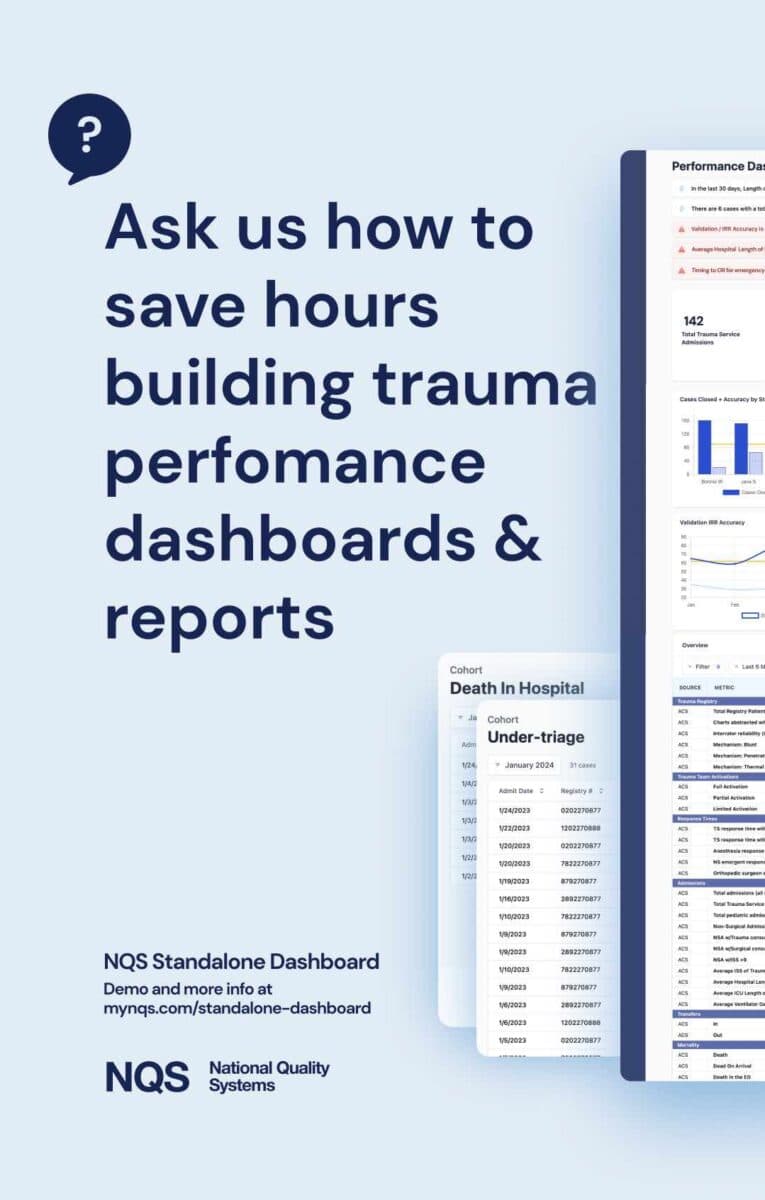Data-driven trauma team performance: Classes we’re excited to attend

As trauma care professionals, navigating the complexities of data and standards for performance improvement can be overwhelming.
But the generous trauma care community can help! These five classes below from top trauma care experts can help us better understand our options to effectively use data and new standards to enhance trauma care.
Check out these traumacon 2024 we're excited to attend.
1. Efficiency and Safety in Trauma Care Processes
The first class centers on creating efficient, LEAN data processes for trauma care, monitoring clinical practice through various data metrics, and cultivating a culture of safety. It aims to streamline compliance with practice guidelines and integrate real-life patient care scenarios for better issue identification and resolution.
Class: Trauma PIPS - The Big 4 in 4
TraumaCon '24 Wed, Apr 10, 12:30p-4:45p
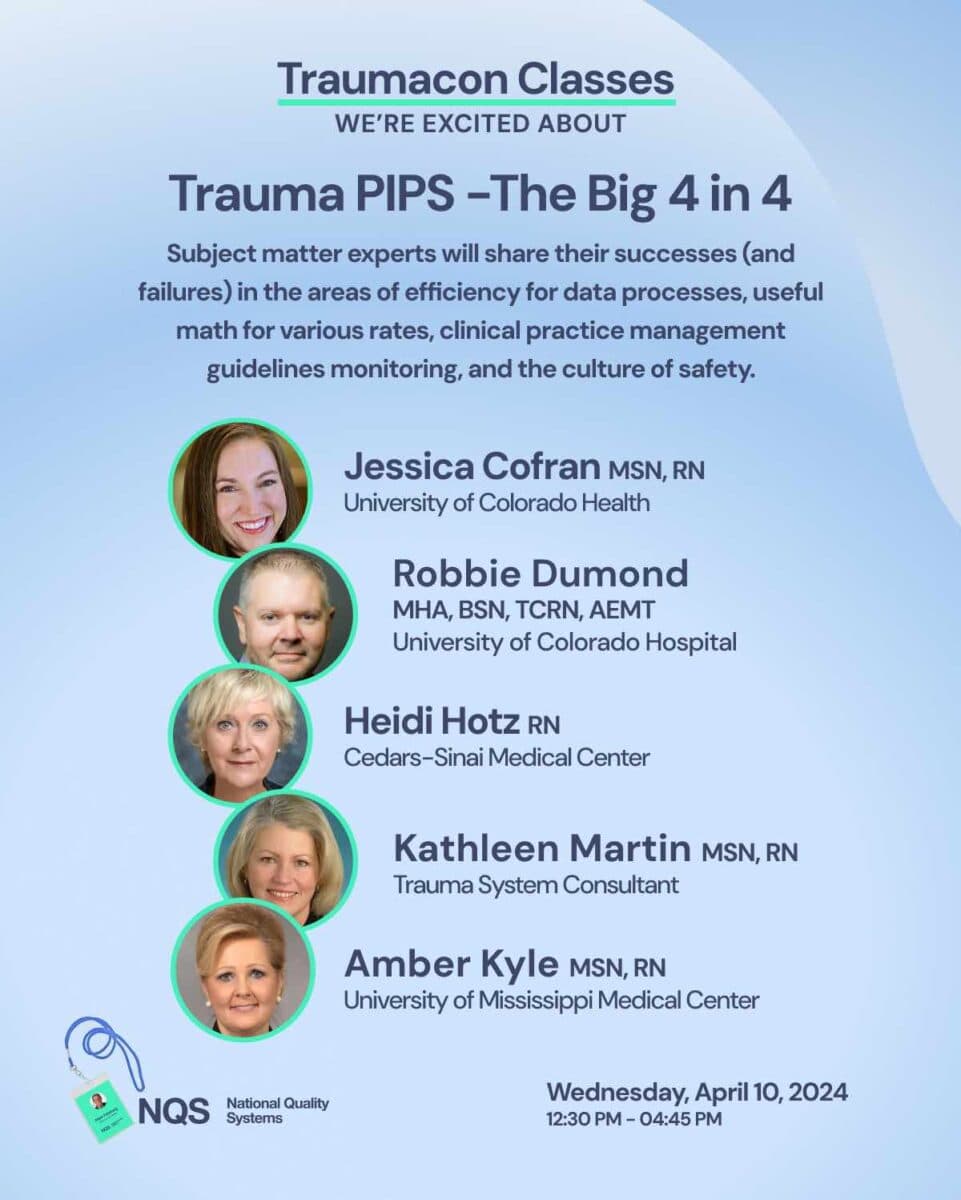
TraumaCon's summary:
During this 4-hour session, subject matter experts will share their successes (and failures) in the areas of efficiency for data processes, useful math for various rates, clinical practice management guidelines monitoring, and the culture of safety. Case scenarios will be utilized to drill down on critical concepts.
Learning Objectives:
- Describe ways of creating efficient, paperless, LEAN data processes that lead to concurrent processes
- Incorporate different ways to monitor care through accurate calculations of audit filters, complication rates, and over-under triage
- Streamline the process of measuring compliance with practice guidelines
- Implement ways to showcase trauma care through data
- Integrate patient care scenarios for issue identification through to event resolution
Speakers:
Jessica Cofran, MSN, RN University of Colorado Health
Jes Cofran is a Trauma Informatics Manager for the UCHealth Northern Colorado Region. She has 12 years trauma nurse experience with specialty in trauma critical care, emergency care, trauma registry, and process improvement. Jes has special interest in utilizing technology to elevate performance improvement processes and develop regional systemization and inter-facility collaboration.
Robbie Dumond, MHA, BSN, TCRN, AEMT University of Colorado Hospital Robbie Dumond is the Director of Trauma Services at the University of Colorado Hospital. Robbie is actively involved in trauma education and improving systems and performance improvement processes. He currently serves as a TOPIC instructor, TNCC instructor, and ATCN instructor. He is a Trauma Designation Reviewer in Colorado and Nebraska and currently is the nurse representative on the American College of Surgeons Trauma Quality Improvement Program Training Project Team.
Heidi Hotz, RN Cedars-Sinai Medical Center
Heidi Hotz is an executive trauma nurse leader overseeing the Level 1 trauma program at Cedars-Sinai Medical Center. She has served in the elected position of President in 4 trauma professional organizations: STN, ATS, Trauma Managers Association of California, and the LA Assoc. of Trauma Program Managers. She is the recipient of the STN's Trauma Leadership Award. She was awarded the EAST Honorary Membership, being the second nurse to receive this honor.
Amber Kyle, MSN, RN University of Mississippi Medical Center Amber Kyle is the Director of Trauma Services at the University of Mississippi Medical Center. She has over 25 years of experience in trauma care and trauma system development. She has served in a variety of leadership roles with the Society of Trauma Nurses and currently co-chairs the TOPIC Committee.
Kathleen Martin, MSN, RN Trauma System Consultant Kathleen is a trauma system consultant who develops trauma centers and systems globally, She served as senior director of trauma services at UCHealth, and was the trauma nurse director at Landstuhl Regional Medical Center, Germany (1at ACS-verified trauma center outside the US) and trauma program manager at the Hospital of the University of Pennsylvania. She served for 19 years on the STN Board of Directors, 2000-2001 STN president and a charter developer of TOPIC.
2. Data Quality and Reliability
The second class discusses the importance of data accuracy and reliability in the trauma registry and performance improvement platforms. It focuses on optimizing practices to improve patient outcomes and ensure the credibility of TQIP (Trauma Quality Improvement Program) reports through interrater reliability.
Class: Improving Patient Outcomes with TQIP Interrater Reliability, is Your Data Real?
TraumaCon '24 Fri, Apr 12, 8:00a-9:00a
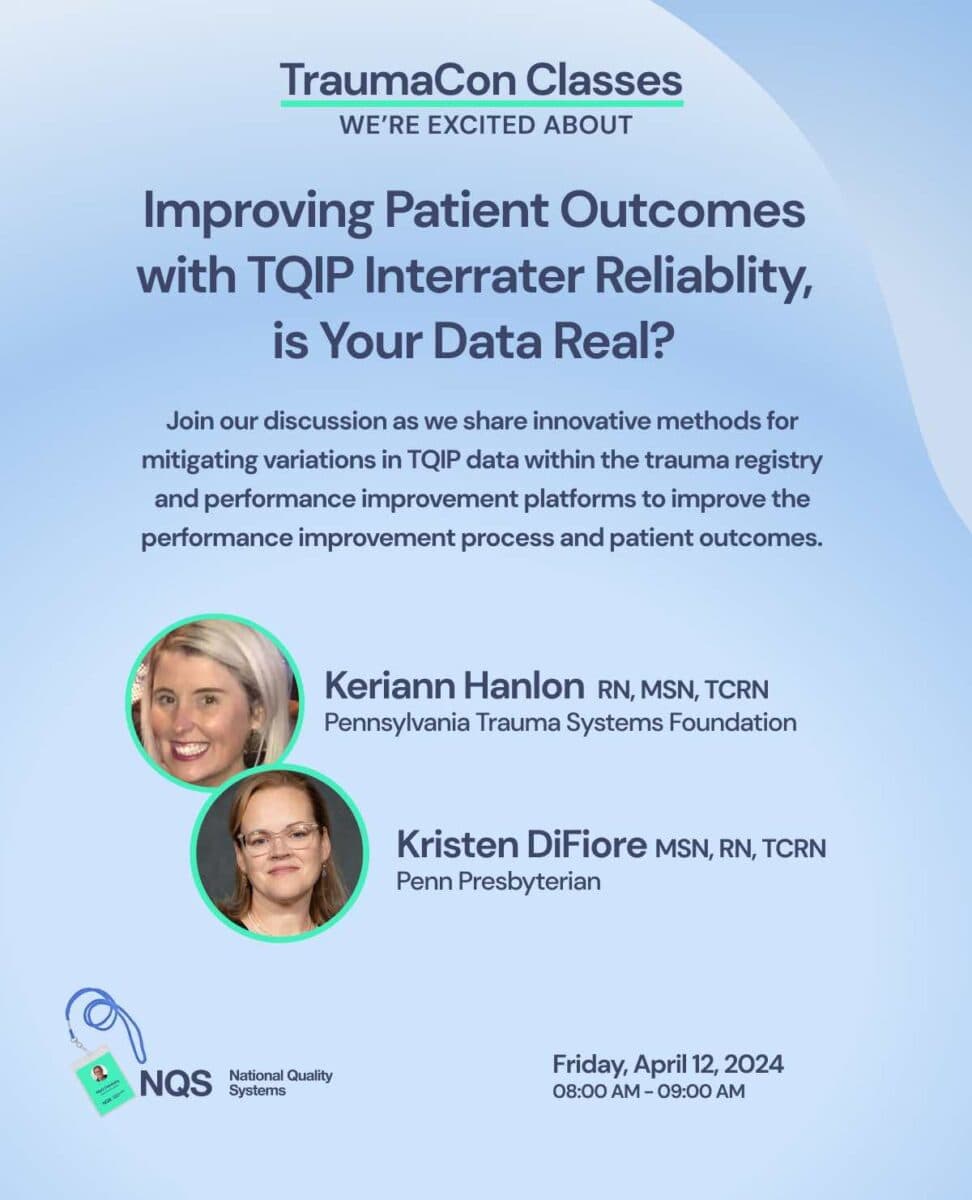
TraumaCon's summary:
Join our discussion as we share innovative methods for mitigating variations in TQIP data within the trauma registry and performance improvement platforms to improve the performance improvement process and patient outcomes. Optimizing practices prior to the MTDB submission will help to prevent inaccurate, unfavorable, TQIP reports.
Learning Objectives:
- The learner will be able to identify the specific NTDB events used to generate TQIP Pre-driller reports from the trauma registry and PI databases
- The learner will be able to describe the process for comparing data in the trauma registry and PI reports prior to data submission to TQIP to help inform inter-rater reliability practices
- The learner will be able to decipher their TQIP pre and post driller reports to determine areas for improvement in the PI process and improve patient outcomes
Speakers:
Kristen Difiore, MSN, RN, TCRN Pennsylvania Trauma Systems Foundation Kristen DiFiore, MSN, RN, TCRN is an Accreditation Specialist for the Pennsylvania Trauma Systems Foundation. She earned both her Bachelor of Science in Nursing and Master of Science in Nursing Leadership and Administration from Immaculata University. Prior to joining the PTSF, Kristen served as the Lead Performance Improvement Coordinator for Penn Presbyterian Medical Center, a Level I Trauma Center, and worked in the trauma surgical ICU. Additionally, Kristen has published on the topic of PI.Keriann Hanlon, RN, MSN, TCRN Penn Presbyterian
Keriann Hanlon, MSN, RN, TCRN, CCRN is the Trauma Performance Improvement Coordinator at Penn Presbyterian Medical Center, an accredited Level 1 urban, adult trauma center in Philadelphia. Previously she worked in the trauma surgical ICU. Keriann is a member of Pennsylvania Performance Improvement and Patient Safety committee and the PA Trauma Nurse Advisory Council. Keriann has presented her work nationally at the STN and TQIP conferences.
3. Interpreting the "Grey" Book
The third class provides insights into the interpretation and implementation of updated care standards as per the "Resources for the Optimal Care of the Injured Patient," emphasizing the importance of flexibility and interpretation in meeting these standards across different institutions.
Class: Not Black or White, it's the "Grey" that Matters!
TraumaCon '24 Fri, Apr 12, 11:25a-12:25a
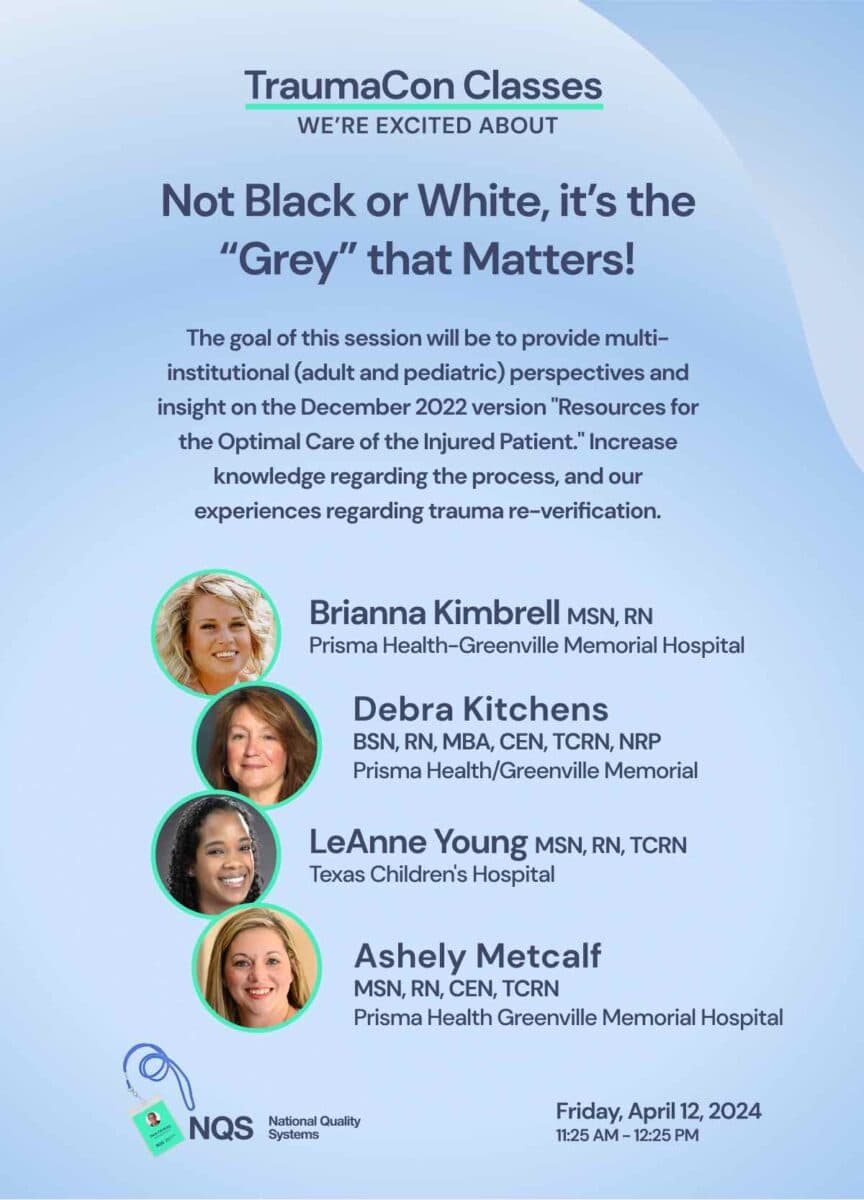
TraumaCon's summary:
An updated version of the "Resources for the Optimal Care of the Injured Patient" was released in March of 2022 with a December 2022 update. The goal of this session will be to provide multi-institutional (adult and pediatric) perspectives and insight on the December 2022 version. The hospitals represented all have re-verified under the new edition. How those hospitals interpreted the "grey" book, and the results of their site visits under the new requirements will be offered.
Learning Objectives:
Increase knowledge regarding the process, and our experiences regarding trauma re-verification using the December 2022 "Resources for the Optimal Care of the Injured Patient."
Speakers:
Brianna Kimbrell, MSN, RN Prisma Health-Greenville Memorial Hospital
Brianna Kimbrell has 10 years of adult and pediatric nursing experience and 8 years of specialized pediatric trauma experience. She has a Master of Science in Nursing with a focus in education obtained from Liberty University. She has been in her current role as Pediatric Trauma Coordinator for Prisma Health at Greenville Memorial Hospital for 4 years. In this position, she is actively involved in continuous performance improvement, education, and research for the pediatric trauma population. Debra Kitchens, BSN, RN, MBA, CEN, TCRN, NRP Prisma Health/Greenville Memorial
Debra has 36 years of trauma experience with over 21 years’ experience in trauma program management and operations. Debra has been a peer reviewer for the JTN for the past 3 years and currently serves on JTN Editorial Board. Debra is an ATCN educator & course director. She will be serving in the role of chair for the ATCN Revision committee for the 9th edition. Debra was the recipient of the 2020 STN Leadership award. Debra is also a member of the Trauma Association of SC and ENA. LeAnne Young, MSN, RN, TCRN Texas Children's Hospital
LeAnne Young oversees Trauma & Injury Prevention at Texas Children's Hospital. She has over 18 years of trauma nursing experience with over 12 years in adult & pediatric trauma program operations. LeAnne has presented both nationally & internationally on pediatric trauma mortality, child physical abuse, and trauma performance improvement. She is an active member of STN, TCAA, PTS, EAST, ATS and the ACS.
Ashley Metcalf, MSN, RN, CEN, TCRN Prisma Health Greenville Memorial Hospital
Ashley Metcalf has almost 20 years of emergency and trauma nursing experience. She has been involved in several ACS consult and verification visits in her current role as PI Coordinator at Prisma Health Greenville Memorial in SC. She is an ATCN Director, Faculty, Regional Director and Chair of the ATCN QA Subcommittee. Ashley's research has been published in the Journal of Trauma Nursing. Additionally, she is an item writer for the TCRN practice exam through BCEN.
4. Trauma Registry Data Validation
The fourth class is dedicated to improving the quality of trauma registry data, important for driving program quality and process improvement initiatives. It highlights the tools and education needed to develop a consistent and effective audit process for data validation.
Class: Credible Edible Data? Registry Analysis Processes to Improve Data Quality
TraumaCon '24 Fri, Apr 12, 1:25p-2:25p
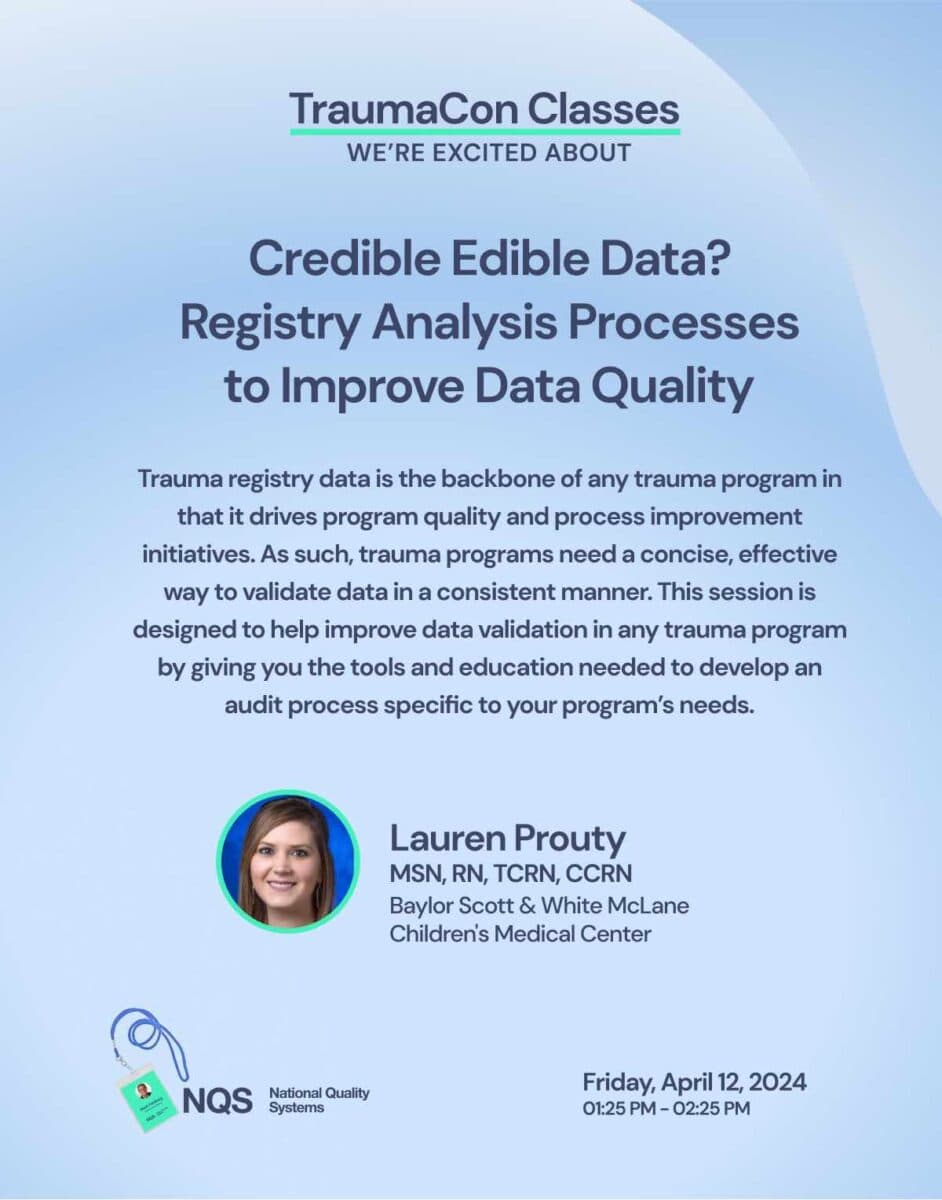
TraumaCon's summary:
Trauma registry data is the backbone of any trauma program in that it drives program quality and process improvement initiatives. As such, trauma programs need a concise, effective way to validate data in a consistent manner. This session is designed to help improve data validation in any trauma program by giving you the tools and education needed to develop an audit process specific to your program’s needs.
Learning Objectives:
- Attendee will define the concept of inter-rater reliability (IRR) as it relates to data abstraction and registry utilization in trauma
- Attendee will have an increased understanding of how inter-rater reliability audits can promote quality data abstraction and increase validity of benchmarking reports
- Attendee will have the resources necessary to develop a registry audit process specific to their program needs
Speakers:
Lauren Prouty, MSN, RN, TCRN, CCRN Baylor Scott & White McLane Children's Medical Center
Lauren started her nursing career in 2012 as a bedside trauma nurse, transitioned to trauma administration in 2016 and completed her MSN in Leadership and Management in 2019. During her time as a nurse, she has obtained multiple advanced certifications, presented at STN and ENA conferences, assisted in revising previous ATCN and TNCC courses, reviewed publications for The Journal of Trauma Nursing as well as participated in trauma committees on the local, state, and national levels.
5. Compliance Through Documentation
The final class underlines the role of thorough documentation in demonstrating compliance with trauma care standards and best practices. It explores ways to effectively document compliance and utilize the Performance Improvement and Patient Safety (PIPS) process to validate adherence to standards.
Class: The Impact of Documentation in Demonstrating Trauma Center Compliance
TraumaCon '24 Fri, Apr 12, 2:30p-3:30p
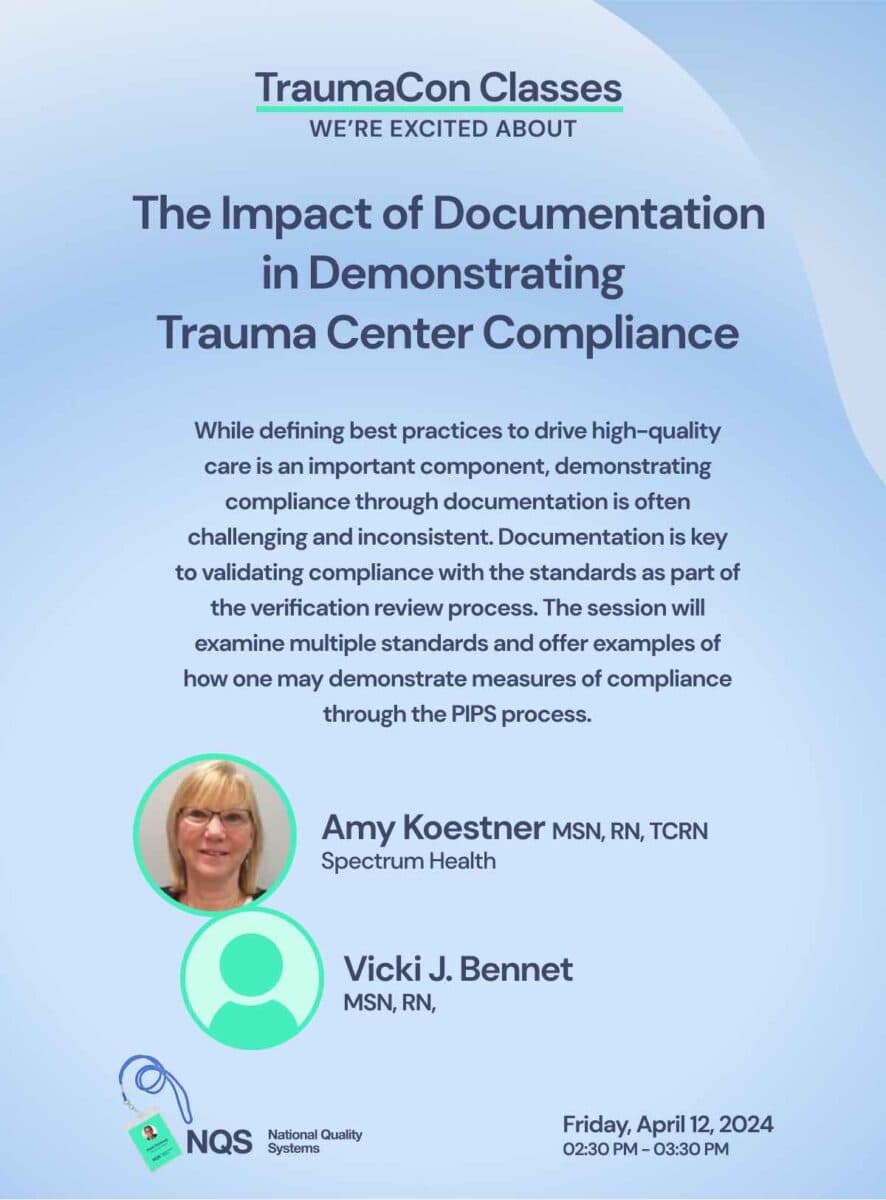
TraumaCon's summary:
The ACS standards focus on the resources for optimal care of the injured patient. While defining best practices to drive high-quality care is an important component, demonstrating compliance through documentation is often challenging and inconsistent. Documentation is key to validating compliance with the standards as part of the verification review process. The session will examine multiple standards and offer examples of how one may demonstrate measures of compliance through the PIPS process.
Learning Objectives:
- Discuss select ACS 2022 trauma standards and response requirements
- Describe processes that will demonstrate standard compliance
- Review examples of documentation that provides measures of compliance
Speakers:
Amy Koestner, MSN, RN Spectrum Health
Ms. Koestner has a 35-year nursing career, with experience spanning pediatric ICU, flight nursing, and the past 20 years in the role of trauma program manager. She is the current Trauma Program Director at Spectrum Health Butterworth in Grand Rapids, MI. She has served as an appointed STN chair liaison to the Committee on Trauma. Amy participated in the Resource Manual for Optimal Trauma Care manual revisions. Is current faculty for ATCN and the Optimal course. She serves as a nurse reviewer for the ACS and multiple state systems for trauma verification.
Vicki J. Bennet, MSN, RN No bio
Meet us at TraumaCon
Going to TraumaCon? We’d love to see you there. If we don’t see you at the TraumaCon classes above, visit us at our booth #206. Talk with the NQS team. Get a sneak peak at the NQS Standalone Dashboard and Reporting tool and other NQS products. And be a part of a special program where we'll donate to a worthy trauma charity in your name.
Not going to TraumaCon or reading this after TraumaCon? We’d still love to talk with you! Contact us via contact, via the chat on this page or book a demo for the demo or the demo.
Conclusion
Staying ahead in the evolving field of trauma care is key. The five classes above look to offer great insights into leveraging data and the latest standards for superior patient outcomes and team performance.
Seize the opportunity to learn solid techniques that can lead your trauma team toward excellence. And start a conversation with us! We’d love to talk with you about these topics and more.
